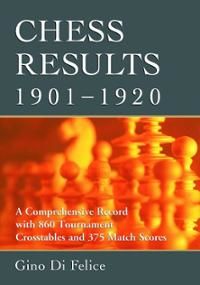Chess Results 1901-1920
Gino Di Felice

When Chess Results 1901-1920 arrived, I was just heading out with my wife for lunch. She pulled it out of my hands, turned it upside down, then sideways, and began to laugh. “What in the hell is this? she asked.
I took the book back, looked at it and also laughed. Some of the sections were (seriously!) better read sideways! However, to be fair to Chess Results 1901-1920, sideways looks pretty damn good.
She was encouraged by my laughter, and continued, “Who in the world would want to read such a boring nothing of a book?
She was referring to the fact that Chess Results 1901-1920 is (to quote the subtitle) “A Comprehensive Record with 860 Tournament Crosstables and 375 Match Scores.
Fascinating stuff, no doubt. Here we have no prose, no tournament buildups, no discussion about the tournament winner. Instead, we get (on page30): “MONTE CARLO, 9 II-17 III 1903 followed by the full crosstable of the event so much for page 30. Other pages usually give us more juice the busy page 31, for example, presents no less than three crosstables and also sticks in the playoff result to MELBOURNE (AUS), 12 II-? VII 1903 Handicap Tourney of the Melbourne Chess Club. Ill tell you this for me, that page 31 was an emotional rollercoaster!
We continued to giggle at the poor old Chess Results 1901-1920 for the duration of lunch. Then, after we got home and I finally entered the privacy of my office, I opened the book and thoroughly enjoyed a solid two-hour read (well, theres not much to read “scan is probably a better word) of each and every page. Later, while talking to IM Donaldson about this book, I said, “I think Ive just proven that Im the worlds biggest nerd.
In one sense, then, Im trashing this book so the history-hating reader will know to avoid it. In fact, many players who enjoy chess history would probably look blankly at this and Mr. Gino Di Felices other books in this series.
On the other hand, I found myself staring at those other volumes and wishing I owned them! The Chess Results series allows one to carefully study the ups and downs of almost any grandmaster (and many non-grandmasters too), to see how he did against the others he regularly competed against, and to marvel at the huge plus scores many top players scored in these events. Some samples:
Saint Petersburg 1902 had Chigorin score a fantastic 12 2 result! Clear first, right? No, Levin also scored 12 2! Hey, it was only plus 10. You cant expect to win a tournament with plus 10, can you?
How about Coburg (Germany) 1904? Here we see such powerhouses as Vidmar, Duras, Nimzowitsch, Cohn, Johner, Max Lange, Spielmann, and Neumann battle it out with various lesser lights. And the result? Duras scores a big 12 1/2 3 1/2 plus 9! Who scores plus 9 in a strong event nowadays? Sadly, he only came in third! Neumann (wasnt he a character from Seinfeld?) and Vidmar both garner 13 1/2 points (plus 11!!!) for a share of first!
Von Bardeleben won Berlin 1902 by the insane score of 12 1/2 1/2, only dropping one draw to Walter John, who took second with 9.
Chigorin (about 96 years old at this time) in Moscow 1901 (2nd Russian National Tournament), scored an astounding 16 1/2 out of 17 games!
And how about Monte Carlo 1901? With such players as Marshall, Schlechter, Chigorin, Alapin, Mieses, Blackburne, Marco, Janowski, and Winawer present, who would take top honors. To my amazement, Janowski took clear first with 10 1/4 points to the second place Schlechters 9 1/2. No, that quarter point is no typo (Initial games, if drawn, counted 1/4 and were replayed. If the replayed game was drawn, both players won another 1/4. The winner of a replayed game received 1/2, the loser 0)!
Exciting stuff, dont you agree? If these results were NOT exciting or even of serious interest to you, then Chess Results wont be your cup of tea (unless you write chess articles and books and need them as reference sources). However, if you found yourself getting worked up at my descriptions of a few tournaments, imagine how “860 Tournament Crosstables and 375 Match Scores will affect you? In fact, perhaps (like with Viagra) you should consult your doctor before reading this hot stuff I dont want to be held responsible for your collapse after you see just how dominating Marshall was in Saint Louis 1904, or how Maroczy scored one of his greatest triumphs in Ostend 1905, or how Fleischmann fleshed out the field and then ruled it in Budapest 1906, or how (in Ostend 1906) Schlechter Ill leave the rest to your imagination.
UPDATE for 2013:
The above was written a few years ago, and now I have to admit that I own all the Chess Results books and cant do without them! They are invaluable tools for the chess writer, and just plain fun to look over for anyone that loves chess history.
